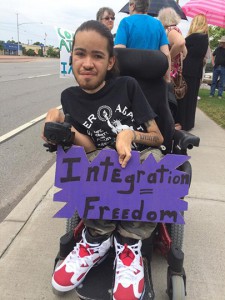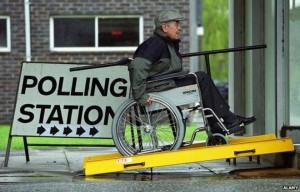As many tune in after my State of the Union response, I want to take a minute to speak about recently proposed legislation that supports Americans with disabilities, a community that is in my heart and on my agenda. pic.twitter.com/xGnZs9AHJv
— Stacey Abrams (@staceyabrams) February 8, 2019

Washington, D.C., Feb. 20 – Earlier this month, Stacey Abrams, the 2018 Democratic nominee for governor of Georgia and a rising star of the party, gave her party’s rebuttal to President Trump’s State of the Union address. During Black History Month, she made history as the first black woman to give the Democratic Party’s State of the Union rebuttal. She impressed the country with her articulate speech and personable stories of her selfless and hard-working father. But she disappointed many in the disability community for her failure to mention people with disabilities.
After disability advocates pointed out her omission of this community, Abrams swiftly responded with the release of a video directed to and tailored specifically for the disability community. She spoke for several minutes about the achievements of and issues critical to people with disabilities, including: Lois Curtis and the landmark Olmstead decision, the Disability Integration Act and community integration, the life and death consequences of repealing the Affordable Care Act, and the effects of using the Americans with Disabilities Act as voter suppression.
 During Black History Month, Abrams Recognizes Lois Curtis.
During Black History Month, Abrams Recognizes Lois Curtis.
Abrams began by recognizing the great Lois Curtis, a black woman with a disability from Georgia, who went all the way to the Supreme Court of the United States in 1999 to fight against forced institutionalization. She is credited for the landmark Olmstead decision, which gave people with disabilities the right to live in a community instead of a nursing home. With February being Black History Month, it was particularly meaningful for an influential African American politician, who has made history, to remember a remarkable woman with a disability, who was historic in her own right.
The Disability Integration Act Gives People with Disabilities Independence.

Abrams also discussed legislation in the works that would greatly impact people with disabilities. She expressed her support for the Disability Integration Act (DIA), legislation that is closely related to the Olmstead decision. The DIA, a bill introduced by Sen. Chuck Schumer (D-NY) and Representative Jim Sensenbrenner (R-WI), would require private health insurance to cover long-term care, such as in-home nursing care and personal care attendants for people with disabilities. Many people with disabilities require assistance with activities of daily living such as showering, toileting and dressing. Long-term care coverage provides these individuals with freedom and independence.

Currently, the only insurance that covers long-term healthcare is Medicaid, which is reserved for those living under the poverty line. Those who require this care are either forced to be unemployed and poverty-stricken or pay upwards of $60,000 or more out-of-pocket for their independence. The current system has trapped many capable and intelligent people with disabilities in an unfulfilling life of unemployment, dependence on entitlement programs, and, often, institutionalization in a nursing home. Many people in the community and politicians, like Abrams, feel the DIA is the solution to guaranteeing the disability community’s right to live among its non-disabled peers and improve its high unemployment rate.
Attempts to Repeal the ACA Threaten the Lives of People with Disabilities
Abrams denounced the GOP’s attempt to repeal the Affordable Care Act (ACA), specifically its protected coverage for those with preexisting conditions. Before the ACA, insurance companies could legally deny coverage for preexisting conditions for as long as the individual had been uninsured, up to a year. For those with disabilities, especially those with life-threatening conditions, this was a difference between life and death, where only the wealthy survived.

President Trump has vowed to repeal the ACA for multiple reasons, many of which are issues that have negatively affected many Americans, with and without disabilities. The ACA’s intention was to bring affordable healthcare for all Americans. However, instead, it has driven insurance companies out of the market, resulting in a lack of competition and a 300 to 400 percent increase in premiums and deductibles. The average middle class American in many parts of the country can no longer afford a basic insurance plan under the marketplace. And, until this year, they were financially penalized for that inability.

The GOP has been successful in repealing the mandate clause of the ACA, which penalized Americans for failure to obtain health insurance. But it has been unsuccessful in repealing any other portion of law, including the preexisting conditions cause. However, Abrams points out that it has not been for a lack of trying. She understands just how life-threatening a pledge to repeal the preexisting conditions clause of the ACA is for people with disabilities. And she strikes back at the GOP for making such a threat.
The ADA Should Not Be Used as A Tool for Voter Suppression

Finally, Abrams rebuked the GOP for using the Americans with Disabilities Act (ADA) as a method of voter suppression. She discussed how more and more polling stations are being closed for inaccessibility, rather than made accessible. As a result, voters must travel long distances to exercise their right to vote. The point of the ADA was not about providing less of anything to Americans — certainly not less democracy. Those who fought for, wrote and passed the ADA would never want it to be used to make voting more difficult for anyone. Rather than closing polling locations for inaccessibility, Abrams suggests reopening the closed polling stations and make them accessible for people with disabilities. Otherwise, she argues, politicians are using the ADA as a tool to pit communities against people with disabilities, in direct contradiction to the purpose and spirit of the ADA.
While Abrams failed to address people with disabilities in her State of the Union rebuttal, she wasted no time in correcting her mistake to show that she values the disability community’s opinion and vote. Lois Curtis went from a nursing home in Georgia to the steps of the Supreme Court, fighting for her right to live outside the confines of an institution. But, today, people with disabilities still are fighting for their rights to healthcare, independence and accessible polling stations. In understanding their past and current battles for equality, Abrams demonstrated that the disability community is on her personal agenda for change.

Be First to Comment